No doubt that exercise can be your safest way towards a trimmed waistline and a stronger physique.
But did you know that it can also be your brain’s best ally?
That is right; research shows that when you work out, not only do you exercise your muscles but also your brain. [1]

It was scientifically proven that customised exercises have long-term benefits for your mental health as they can improve your Brain function, protect it from damage and fight against memory loss, Alzheimer’s Stress and Anxiety.
In addition, research shows that exercise will instantly boost your mood and improves your concentration throughout the day.[1]
Do you think this is all?
What exercising can do to your brain can blow your mind!
Research shows that it can even reduce your risk of dementia and depression by 30% each! [2]
Read on to find out more, and –– I promise –– after reading this article, you will never miss a workout!
Exercises and Mental Health: Why is it Good?
No matter whether you need to put yourself in a better mood, sleep better at night or get rid of your stress and anxiety; mental health exercises can answer your questions.
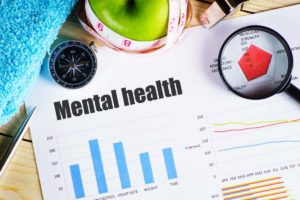 Exercise harnesses a countless number for your nervous system and mental health, including:
Exercise harnesses a countless number for your nervous system and mental health, including:
– A Shield for Your Brain
As we age, our brain function wanes, and our cognition is affected.
This is a normal change associated with the ageing process, which you can see in older people around you.
They forget, they think slower, and their brains process things a little differently.
This occurs because the brain shrinks, and there are fewer functioning neurons.
However, it does not have to be this way!
An MRI study was done to assess the changes in the brains of healthy adults who exercised for 1 hour three times a week for six months only.
The good news is research shows that aerobic physical activity has been shown to increase brain volume in people who exercise regularly. [4]
 It specifically led to improvements in the size of the frontal lobe, which is the front part of the brain responsible for your cognitive and personal processing, mood, personality and emotions. [4]
It specifically led to improvements in the size of the frontal lobe, which is the front part of the brain responsible for your cognitive and personal processing, mood, personality and emotions. [4]
– Stimulating Neurogenesis: Formation of New Neurons
Neurons are the nerve and brain cells responsible for communicating the centres within your brain together so that you can better recognise and interpret things you see, feel and hear, and even think about your memories and happy moments.
These unique cells also connect your brain to your body so that you would know where your body parts are and what they are doing or feeling. [5]
Recently, evidence revealed that new neurons form in the hippocampus (a part in the centre of the brain).
Studies further revealed that exercising could stimulate this process and help your brain make new neurons and, thus, function better as you age. [5]

– Improving Neural Plasticity
Neural plasticity refers to your brain being capable of changing its structure and function based on several factors.
One of these factors is the activities you frequently do.
Back in 2000, MRI scans of taxi drivers in London showed that they had a relatively bigger back of hippocampus compared to non-drivers. [6]
You might wonder, what does the posterior part of the hippocampus do?
This part of the brain is responsible for memory and spatial navigation.
Now you might have guessed it; your brain develops parts that you use and engage in activities and mental health exercises more frequently; something called “exercise-induced plasticity”. [6]
Now imagine if you are exercising regularly and you engage all your body and muscles in a Pilates session, Yoga class, run, a swim or even a dance!
Can you imagine how this will stimulate your brain to develop the parts controlling these complicated movements?
It is totally worth it!
– Better Brain Recovery
Neural plasticity is not only about improving your brain’s structure and function in response to your frequent activities.
It also helps your brain recover after an injury or an insult. [7]
For instance, you might have wondered why some people recover fast and some even fully from a stroke or a head injury, while others take long to recover or have some residual disabilities.
In addition to other factors like the site, severity and nature of the brain insult, research shows that brain plasticity plays an important role in determining how a brain recovers after tissue injury. [7]
When you exercise regularly, you improve blood circulation and nutrition supply to the brain and improve your neural plasticity.
Thus, you give your brain better chances to recover in hard times. [7]
Give your brain now a treat enjoying this full mental health exercise programme and training directly with Jazz Alessi.
Request a free consultation !
Types of Physical Exercise for Mental Health
 If you are looking for the best exercises that can contribute the most to your mental health, you have a long list to choose from.
If you are looking for the best exercises that can contribute the most to your mental health, you have a long list to choose from.
From Pilates, Yoga, body conditioning. simple walking to intense high intensity interval training (HIIT), research shows that each exercise can give you unique benefits and change your body and mind in its very unique way.
Here are some mental health activities that you can start with:
1-2-1 Yoga: Cleansing Your Mind
In 2020, the WHO drew the world’s attention towards the prevalence of depression being the second most common burdening diagnosis all over the globe.
Are you wondering what came on top of the list?
Well, it is worth it to know that depression came second to ischemic heart disease.
This indicates that depression, anxiety and other mental health issues are considered as serious as other diagnoses because they can affect not only one’s mind, but also body.
So, what is the solution?
Medical professionals are exerting extraordinary effort to help you manage your stress, depression and anxiety and other mental health issues using:
• medications,
• behavioural and
• recreational therapies.
But, what if you have a way to improve and even prevent stress, anxiety and mental health issues?
Yoga was proven to be an effective form of Exercises for mental health problems because it has a countless number of benefits that can improve and even prevent your stress, anxiety and mental health.
Here is how:
Ready Whenever You’re Ready!
Yoga provides the best way for you to connect.
Based on the stage you are in throughout your anxiety, stress and / or mental rehabilitation programme; you can enjoy the calmness and the positive feeling of self-consciousness as you practice yoga alone with the best Yoga personal trainer in London.
These one-to-one yoga sessions will help you dig deeper into your soul, mind and body, understand what you want gain the positive me-attitude you have been missing. [8]
Research shows that your professional yoga trainer will help you overcome your problems and positively approach the solutions buried deep within your mind. [8]
 When you are ready, you can progress from one-to-one yoga sessions to group sessions where you can connect further with people and widen your social circle.
When you are ready, you can progress from one-to-one yoga sessions to group sessions where you can connect further with people and widen your social circle.
Yoga is just the best exercises and mental health promoter because it is ready to take you to the next step, but only when you are ready!
Do you want to start your one-to-one yoga training with the right person in order to go the full path towards a successful rehabilitation journey?
Mais is the best person we recommend to start with.
Request a free consultation now!
Better Than Pills
Whether you use anti-depressants or any other medications to stabilise your mental health and improve your symptoms is totally up to your doctor.
But, when there is a chance to use less pills and improve your mental health through natural and less toxic ways, it is always better to give it a shot.
Research has found that laser sharp customised 1-2-1 yoga sessions can be effectively used with medical treatment to treat a number of mental problems including:
– Major Depressive Disorder (MDD)
– Anxiety
– Obsessive Compulsive Disorder (OCD)
– Schizophrenia
– Post-traumatic stress disorders (PTSD) [9],[10]
In addition, 1-2-1 yoga tutoring was used as a single mental health exercise to treat depression on its own and also in combination with pharmacological treatments. [10]
According to research, when used as monotherapy, 1-2-1 yoga tutoring effectively improved the symptoms of mild to moderate depression. [11]
And it was found as effective as tricyclic anti-depressants even in severe major depressive disorders.
And when used in conjunction with anti-depressants, bespoke yoga led to better results when compared to anti-depressants alone. [12]
The results of using yoga poses as exercises for mental health were unbelievable, As Yoga was found to improve:
• Life Quality
• Sleeping patterns
• Reduce stress
• Slow down the heart rate
• Promote relaxation
• Improve and stabilise mood. [13]
Less stress
A very interesting study has studied the effect of yoga on stress in order to find whether yoga can be used as one of mental health activities used to reduce stress and promote a stress-free life.
In this study, scientists measured an enzyme produced in the mouth called “Salivary Amylase”.
This enzyme is well-known for its association with sympathetic activity, which means that it increases when you are under mental of physical stress. [14]
The good news is, this enzyme decreased in both young and senior participants after practicing relaxing yoga asanas and meditation.
This stress-reducing effect was found to occur immediately and last even after the practise has come to an end. [14]
Time to get rid of your stress and feel less tension with the right exercise plan for mental health.
Make sure you are following the right exercise plan by working out under supervision of an expert Yoga personal trainer like Mais.
Request a free consultation now!
Chillaxing the Muscles
Did you know that mental health problems are always associated with tense muscles and spasm all over the body?
Fortunately, as a part of your all-in-one yoga training, research shows that several Asanas will stretch your muscles and improve the flexibility. [15]
Relaxing asanas such as Shavasana will help you relax your body and clear your mind in order to get rid of all the tension. [15]
Pranayama is another great way to take control over your over-breathing and panic attacks.
In Yoga, if you control your prana (breathing) you can control your mind, get rid of the negative ideas and the stresses in order to finally relax your body. [15]
Tai Chi: The Non-Stop Training
Somehow close to the concept of Yoga, Tai chi exercises for mental health use slow, controlled movements connected with breathing in order to:
– Promote positive body awareness
– Produce a state of mindfulness and positivity
– Relax the muscles
– Help you clear your mind
– Promote healthy, deep breathing. [16]
The major difference between Tai Chi and Yoga, is that Tai Chi exercises for mental health keep you in non-stop motion in order to help you better engage with your body and feel the connection between your different body parts. [16]
Researches have revealed that Tai Chi can effectively:
– Reduce symptoms of stress and anxiety
– Reduce symptoms of depression
– Boost mood
– Promote a positive self-esteem
– Promote psychological well-being. [16]
You can also gain all these benefits if you start your anti-stress and mental health rehabilitation programme with UK’s number one elite personal trainer, Jazz Alessi.
 Request your free consultation now!
Request your free consultation now!
One-to-One Pilates Training in London
If you are looking for an exercise that improves your muscle strength, flexibility, boosts your metabolism, body coordination, balance, strengthens your core, but also improves your mental health activities, Pilates might be the best mental health exercises for anxiety and might be the one you are looking for.
No doubt that 1-2-1 Pilates tutoring has long been well-known for being a form of exercise that:
– Requires no to minimal equipment
– Can be practiced anywhere
– Is suitable for different age groups
– Harnesses a countless number of physical benefits
– Does not leave you sore after workout
But the good news is, it is also a great exercise for mental health, as research indicates that 1-2-1 Pilates training can:
– Improve your sleep quality
If you are wondering whether or not Pilates can improve your sleep, the answer is YES!
Research shows that customised Pilates was found to shorten sleep latency (which is how long it takes you to fall asleep), lessen sleep disturbance which means you get to sleep continuously without waking up at night and also can enjoy longer durations of deep sleep. [17]
– Reduce Depression Symptoms
No matter what your symptoms are, whether you are feeling low, lacking energy or being unable to carry out your daily activities, A 1-2-1, 12-week Pilates programme has been found to reduce symptoms of depression by 20%.
And this research [18] was also found to improve function by a whopping of 16%.
– Elevate Serotonin Levels
Serotonin is the hormone responsible for making you feel happy and in a good mood.
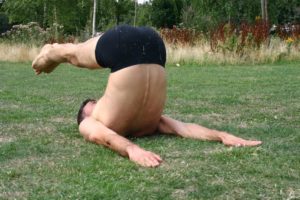 Jazz Alessi – The Roll Over Pilates Exercise
Jazz Alessi – The Roll Over Pilates Exercise
Exercise in general and customised Pilates in particular were found to stimulate your brain to secrete more of this happiness enzyme, giving you a rush of positive thoughts, better mood and high self-esteem. [18]
– Change Your Social Life
No matter whether you exercise on one-to-one basis with your personal trainer or in a Pilates group, Pilates itself was found to increase your self-confidence and drive you to socialise more the only difference is that in 1-2-1 setting you will progress at least twice as fast and eliminate injury risks.
Researches…,
Have proven that individuals who regularly participate in 1-2-1 Pilates training are more likely to be extroverts, connect with other people and make friends.[19]
They were also found to be more emotionally stable, loved by others and able to control their anger and make the right decisions. [19]
How to get started with exercise?
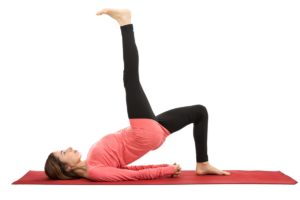 I know what you are thinking…
I know what you are thinking…
With all these exercises for mental health being beneficial and effective in improving mental health, Which one should I start with?
It is normal if all types of exercises look the same to you.
The thing is, one type of exercise might be helpful for you, while it might be harmful for another person.
For example, yoga can give you amazing mental health exercises for anxiety benefits, but, because some poses place stretch on different parts of the body, it might not be the best option for someone with herniated disc injuries, knee injuries, hyper-lax ligaments and unstable spine.
Another example that can help you understand why there is no “one-exercise-fits-all” is that a person might have other conditions in addition to their stress, anxiety and whatever mental health issues they may struggle with.
So, a person with back pain can benefit more from 1-2-1 Pilates training because the Pilates Method of Exercise was created for rehabilitation purposes, it challenges the core muscles in a controlled manner and it can also help you improve your back pain along with depression symptoms.
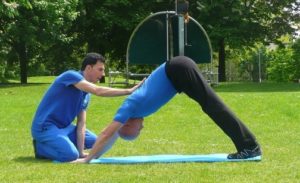 As a bottom line, no matter what your problems are, Jazz Alessi always has the right programme for you up his sleeve.
As a bottom line, no matter what your problems are, Jazz Alessi always has the right programme for you up his sleeve.
His priority is to make sure you are following the programme that is laser sharp customised for what you require so it is safe and effective at the same time.
Do you have a list of your problems and goals ready?
Find out how Jazz Alessi can turn your list into exercise-solutions with his experience in stress elimination, exercises and mental health rehabilitation.
Request a FREE CONSULTATION !
Mental Health Exercises for anxiety and Stress to Help You Relax
Time to say goodbye to your stress, anxiety, mental health problems and welcome a new, positive and happier mindset with a more pro-active lifestyle.
If your goal is to enjoy life to the max, be a positive person and feel at your best at all times, here is how exercise can help you:
1- Cardio Training
Sweating out your fears can be a great way to wind down and boost your mood.
You can simply brisk walk your dog in a park or listen to your favourite music or watch your favourite movie while brisk walking on a treadmill.
Cardio training has many variabilities and it can easily fit into your schedule and match your preferences.
Research shows that aerobic exercises of mild to moderate intensities will stimulate your heart to beat more and will put more challenge on your lungs to breathe deeper. [20]
When your cardiorespiratory system is stimulated, more oxygen is delivered to your cells, including muscles, organs and your brain. [20]
More oxygen equals better cell function and more nourishment, which – for the brain – means better mental functioning, more endorphins (happiness chemicals) and less symptoms. [20]
2- Interval training
If you are looking for an exercise programme that not only will boost your mood, but also your metabolism, interval training is what you are looking for.
Research shows that the right intensity interval training programme (HIIT) combines strength training with cardio to give you the maximum physical and mental benefits. [21],[22]
If carrying extra weight is one of the reasons why you are feeling blue, this type of exercise can help you trim your waistline and get rid of the extra pounds.
It also helps you boost your energy levels and get rid of the always-tired feeling that holds you back from enjoying your life to the max. [21],[22]
Moreover, the right type of HIIT can be your best choice if you want to avoid injuries but have no time, and you want to squeeze a 20-minute exercise into your schedule but still get the maximum benefits despite the short duration.
Nature Walks and Forest Bathing
 Have you ever heard of “biophilia”?
Have you ever heard of “biophilia”?
This word refers to our innate tendency to love nature, connect with and enjoy it.
This is why nothing is better than combining the mental health benefits of exercising with the beauty of greens and nature.
Research shows that taking your morning run to a park or going for a jog in the forest can help you clear your mind and enjoy the fresh breeze on your face as you run. [23]
The greenery, the smell of the wet soil and the sound of singing birds can take you to a whole new level of peacefulness and mindfulness.
Moreover, emerging yourself in a lake and cold water swimming in the heart of the forest / park can be the perfect way to wash your worries away and enjoy a fresh start.
A recent systematic review has reported the effectiveness of forest therapy after reviewing 393 research papers related to forest activities (e.g., forest bathing, walks… etc.)
Doing these activities in an open landscape, in fresh air makes you feel powerful, limitless and capable of conquering your symptoms. [23]
Swimming and Aquatic Exercise
Similar to exercising in the nature, water is another source of calming yourself and getting rid of your stresses.
Swimming in a pool, a lake or in sea can improve your mental health.
Imagine that you are weightless, and you are surrounded by water all around and you are just feeling light.
You can also float on the surface of the pool, breathe deeply and enjoy being carried and swung by the gentle waves.
In addition, although there is no strong evidence, the blue colour of the pool, sea, and the sky is known to promote relaxation and make you feel peaceful.
How Exercise Helps Anxiety
If you are worried, anxious, stressed or depressed and you have clearance to exercise, Jazz Alessi can create the right programme for you to help you get rid of your symptoms and meet both your physical and mental boosting goals.
For Jazz, everyone is unique, this is why he has no similar programmes for two different people.
Although anxiety is one diagnosis that can apply to many, everyone has his own symptoms and everyone deals with the stress differently.
For instance, if you have anxiety, you cannot exercise for long, and you feel out of breath, or you have a dreaming personality and like to connect to your body, he might recommend you a programme that contains breathing exercising and low-intensity aerobic exercises.
While if you are diagnosed with anxiety and you need to:
– Lose weight,
– Boost your metabolism
– Get rid of your lower back pain
– Rehabilitate your knee injury
– Improve your energy levels, or
– You like challenges
Jazz will consider different types of HIITs in order to achieve your physical as well as mental goals.
Meanwhile,
If you have knee, shoulder or joint problems, this will not hold him back, he will recommend customised Pilates, resistance bands programmes, swimming or aquatic exercises in order to give you the benefits of exercise without dangerously overloading your joints.
In a nutshell, as his clients say here Jazz Alessi is totally dedicated to improve your mindset, go beyond achieving your goals and transform your life.
However, he does this by following the up-to-date evidence-based customised personal training and selects only the best exercises that fit you like a glove so that you get a laser-sharp personalised rehabilitation programme.
What Is the Best Diet for Mental Health?
“You are what you eat”, this is true not only for your body and looks, but as per Harvard University research also for your brain and mental health.
In fact, the food you consume has a huge impact on how your brain functions.
Thus, it affects your concentration, cognition, personality memory and mood – this is effective nutrition psychiatry.
How eating healthy can affect your mental health?
Different foods create different metabolic effects and at the end different biological end effect.

So you might wonder…
What is the relation between my stomach and brain?
Are they even connected?
The answer is Yes!
There are complicated chemical neurotransmittors that connect your stomach to your brain.
In other words, the food you eat trigger secretions of specific chemicals that can affect your organs, including your brain.
For instance, some foods like sweets, soda drinks and refined food might taste good while they are still on your tongue, but once they travel through your body, they are no longer as sweet as they tasted.
In fact, these sugars lack nutritional value and they can cause a sudden rise in your blood sugar that requires your body to secrete a large amount of insulin to deal with this rise.
However, these sugars are easily broken down and a sudden drop in your blood sugar occurs leaving you in a bad mood, tired, easily irritated, always hungry and also malnourished. [24]
If you suffer from diabetes type 2, PCOS, arthritis, osteoarthritis, high cholesterol levels and want to change your diet plan and you are not sure what to eat.
It is time to consult Jazz Alessi, London’s number one elite personal trainer and long-term Harley Street nutrition expert.
Request your free consultation now!
Foods to Eat When Stressed
When we are under stress, we usually crave things that we know we like.
In other words, things we find tasty and we really enjoy having – think stress related compulsory eating habits.
But, these foods we crave are not always the best options.
This is why it is important to give our food choices a second choice before we head to the fridge door – or to the fast-food restaurant.
When you are stressed, remember that the poor foods you may choose only make you happy you momentarily but they can and most of the time worsen your symptoms later on.
Make sure you replace stress-related food choices with healthier ones.
For instance, here are some replacements to consider:
Warm herbal Beverages Vs Energy Drinks
You might automatically assume that an energy drink will make you feel better and less tired.
But this is not true.
In fact, energy drinks are full of sugars, disrupt your good gut bacteria and it will trigger inflammation in your body and hinder your cells from functioning properly.
It might momentarily provide you with energy because you get excito-toxins and / or sugar into your body, but soon after the excito-toxins or the sugar is processed, you will return to feeling even more tired and drained.
These drinks also provide you with a high count of calories with no nutrition values.
Which on the long run can make you gain extra pounds (that you will stress more to lose).
Instead, you can turn to warm beverages from natural herbs.
 For example, research shows that chamomile tea is a great herbal drink that can help you relax and sleep better at night so that you would not feel tired during the day (nor seek power drinks!). [25]
For example, research shows that chamomile tea is a great herbal drink that can help you relax and sleep better at night so that you would not feel tired during the day (nor seek power drinks!). [25]
You can also consider fresh juices that are rich in anti-oxidants and anti-inflammatory agents.
For instance, watermelon, orange and pomegranate juice that also contain several vitamins (especially vitamin C), minerals and phytonutrients combined with certain greens that can reduce inflammation and free radicals in your body. [26]
Fermented Foods Vs. Processed Foods
Processed foods (e.g., pepperoni, hot dogs, or French fries and ready-to-eat snacks) can be your worst enemies because they are:
– Rich in saturated fats
– Rich in trans fats,
– Rich in omega-6 fatty acids
– High in LDL poor cholesterol
– Low in HDL good cholesterol
These unhealthy fats increase levels of inflammation in your body resulting in pronounced mood and hormonal changes.
If you decide on eating a healthy, anti-anxiety diet, try to avoid processed foods and replace them with organic and naturally fermented foods that:
– Have a high nutritional value
– Contain bioactive compounds that improve digestion and absorption of food and nutrients
– Interact with your gut microbes to inhibit/compete with existing members of the gut microbiome which enhances your digestive health and improves your body’s ability to use micronutrients in the food you eat.
– Promote an anti-inflammatory response in your body. [27]
Examples of fermented foods include homemade Kimchi, sauerkraut, and pickles.
Raw Vegan Foods Vs. Dried and Cooked Foods
At some point, you might think that fresh and dried veggies and fruits are the same.
But this is not true, in many circumstances a plant-based diet with raw veggies in it can provide more nutritional benefits to your body.
 The reason behind this is that raw vegan food contains more live enzymes, micronutrients, fibres and when are chewed properly it can improve how your digestive system functions leading to better absorption of the micronutrients that your brain needs to function properly.
The reason behind this is that raw vegan food contains more live enzymes, micronutrients, fibres and when are chewed properly it can improve how your digestive system functions leading to better absorption of the micronutrients that your brain needs to function properly.
While the same foods in a dried condition contain more sugars and less fibres.
When cooked, food tends to lose some or all (like vitamin C) of its nutritional values and becomes less nutrition-worthy.
For this reason, in certain circumstances is better to consume food in their original, raw form.
Water Vs Caffeine
If you wake up to a cup of coffee, it is time to change this habit and replace your coffee with a glass of water.
Drinking water and proper hydration were found to decrease anxiety and reduce blood cortisol levels (the stress hormone) and helps your brain function better.
On the other hand, caffeine makes you irritable, and interferes with the quality of your sleep when you drink it late in the evening. [28]
And worse than that, researches have reported a link between high intake of caffeine and anxiety and depression (when you build your happiness on caffeine).
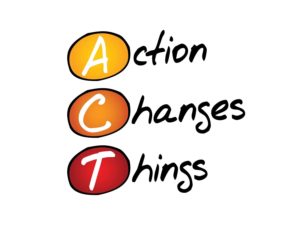 For this reason, if you are a caffeine lover, try to slowly replace it with water and other fresh drinks in order to achieve better mental health. [28]
For this reason, if you are a caffeine lover, try to slowly replace it with water and other fresh drinks in order to achieve better mental health. [28]
At the same time, BE AWARE that research shows that when coffee it is used correctly it can reduce your liver fibrosis, supports your body detoxification better and it could improve your lifespan with about 2 – 2 ½ years.
Are you looking for the best and healthier – yet tasty – replacements for the foods you know are harmful to your mental health?
Get your diet customised up to your liking with Jazz Alessi.
Keen to get happier, younger and healthier?
REQUEST A FREE CONSULTATION !
Who is Jazz Alessi?
Jazz Alessi is UK’s number one exercise expert, he follows evidence-based approaches and combines exercise, nutrition and lifestyle modification to help you change your life and unleash the best version of yourself.
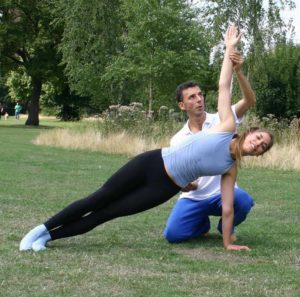 Through his years of experience, he trained medical doctors, A list of actors and actresses and also elite athletes through their successful body transformation and injury rehabilitation journeys.
Through his years of experience, he trained medical doctors, A list of actors and actresses and also elite athletes through their successful body transformation and injury rehabilitation journeys.
He provides education to LSE Athletic Division, Cameron McKenna, City Group PLC and knows exactly how to personalise an exercise programme to meet your personal goal and improve your mental health.
For Jazz, the mind and body are closely connected, your muscle spasm can be traced from your posture, stress and your anxiety, depression can be because of your injury, overwork, lack of correct exercises, loses or even feeling unhappy and being overweight.
So, no matter what your problem is, Jazz Alessi will help you find the shortest way to fix it once and for all.
REFERENCES
1- Reslan, Mohammad Amine & Tabet, Maha & Yehya, Yara & Shaito, Abdullah & Kobeissy, Firas. (2022). The Brain And Exercise: In Sickness And In Health. Frontiers for Young Minds. 10.3389/frym.2022.632277. https://www.researchgate.net/publication/359466029_The_Brain_And_Exercise_In_Sickness_And_In_Health
2- Northumberland Tyne and Wear NHS foundation – Benefits of exercise for mental and physical health
https://www.cntw.nhs.uk/content/uploads/2016/08/Benefits-of-exercise-and-mental-health.pdf
3- https://www.researchgate.net/publication/23247248_Exercise_is_brain_food_The_effects_of_physical_activity_on_cognitive_function
4- Paillard T, Rolland Y, de Souto Barreto P. Protective Effects of Physical Exercise in Alzheimer’s Disease and Parkinson’s Disease: A Narrative Review. J Clin Neurol. 2015 Jul;11(3):212-9. doi: 10.3988/jcn.2015.11.3.212. PMID: 26174783; PMCID: PMC4507374. https://www.ncbi.nlm.nih.gov/pmc/articles/PMC4507374/
5- Ploughman, Michelle. (2008). Exercise is brain food: The effects of physical activity on cognitive function. Developmental neurorehabilitation. 11. 236-40. 10.1080/17518420801997007.
https://www.researchgate.net/publication/23247248_Exercise_is_brain_food_The_effects_of_physical_activity_on_cognitive_function
6- Sebastian Abrahamsson (2017) NEUROPLASTICITY INDUCED BY EXERCISE – university of Skovde
https://www.diva-portal.org/smash/get/diva2:1120798/FULLTEXT01.pdf
7- Ploughman, Michelle. (2008). Exercise is brain food: The effects of physical activity on cognitive function. Developmental neurorehabilitation. 11. 236-40. 10.1080/17518420801997007.
https://www.researchgate.net/publication/23247248_Exercise_is_brain_food_The_effects_of_physical_activity_on_cognitive_function
8- Shroff, Farah & Asgharpour, Mani. (2017). Yoga and Mental Health: A Review. Journal of Physiotherapy & Physical Rehabilitation. 02. 10.4172/2573-0312.1000132.
https://www.researchgate.net/publication/316946652_Yoga_and_Mental_Health_A_Review
9- Saeed SA, Cunningham K, Bloch RM. Depression and Anxiety Disorders: Benefits of Exercise, Yoga, and Meditation. Am Fam Physician. 2019 May 15;99(10):620-627. PMID: 31083878.
https://pubmed.ncbi.nlm.nih.gov/31083878/#:~:text=Yoga%20as%20monotherapy%20or%20adjunctive,depression%2C%20but%20effects%20are%20inconsistent.
10- Büssing, Arndt & Michalsen, Andreas & Khalsa, Sat Bir & Telles, Shirley & Sherman, Karen. (2012). Effects of Yoga on Mental and Physical Health: A Short Summary of Reviews. Evidence-based complementary and alternative medicine : eCAM. 2012. 165410. 10.1155/2012/165410.
https://www.researchgate.net/publication/231176721_Effects_of_Yoga_on_Mental_and_Physical_Health_A_Short_Summary_of_Reviews
11- Pilkington K, Kirkwood G, Rampes H, Richardson J (2005) Yoga fordepression: the research evidence. J A ect Disord 89: 13-24
https://pubmed.ncbi.nlm.nih.gov/16185770/
12- N. Janakiramaiah, B.N. Gangadhar, P.J. Naga Venkatesha Murthy, M.G. Harish, D.K. Subbakrishna, A. Vedamurthachar: Antidepressant efficacy of Sudarshan Kriya Yoga (SKY) in melancholia: a randomized comparison with electroconvulsive therapy (ECT) and imipramine, Journal of Affective Disorders, Volume 57, Issues 1–3,
https://www.sciencedirect.com/science/article/abs/pii/S0165032799000798?via%3Dihub
13- Alyson Ross and Sue Thomas: The Health Benefits of Yoga and Exercise: A Review of Comparison Studies. The Journal of Alternative and Complementary Medicine.Jan 2010.3 12. http://doi.org/10.1089/acm.2009.0044
https://www.liebertpub.com/doi/10.1089/acm.2009.0044
14- Gururaja D, Harano K, Toyotake I, Kobayashi H. Effect of yoga on mental health: Comparative study between young and senior subjects in Japan. Int J Yoga. 2011 Jan;4(1):7-12. doi: 10.4103/0973-6131.78173. PMID: 21654969; PMCID: PMC3099103.
https://www.ncbi.nlm.nih.gov/pmc/articles/PMC3099103/
15- Swatmarama. commentary by Swami Muktibodhananda. 3 rd ed. Hatha Yoga Pradipika, Munger, India: Yoga Publications Trust; 1998. p. 150.
https://terebess.hu/english/Hatha-Yoga-Pradipika-Muktibodhananda.pdf
16- Wang, C., Bannuru, R., Ramel, J. et al. Tai Chi on psychological well-being: systematic review and meta-analysis. BMC Complement Altern Med 10, 23 (2010). https://doi.org/10.1186/1472-6882-10-23
https://bmccomplementmedtherapies.biomedcentral.com/articles/10.1186/1472-6882-10-23
17- Chen Z, Ye X, Shen Z, Chen G, Chen W, He T, Xu X. Effect of Pilates on Sleep Quality: A Systematic Review and Meta-Analysis of Randomized Controlled Trials. Front Neurol. 2020 Mar 24;11:158. doi: 10.3389/fneur.2020.00158. PMID: 32265816; PMCID: PMC7105773.
https://pubmed.ncbi.nlm.nih.gov/32265816/
18- Roh SY. The effect of 12-week Pilates exercises on wellness in the elderly. J Exerc Rehabil. 2016 Apr 26;12(2):119-23. doi: 10.12965/jer.1632590.295. PMID: 27162774; PMCID: PMC4849491.
https://www.sciencedirect.com/science/article/pii/S1877042813002474/pdf?md5=c2fc84908982e6cac91640c2adc90dea&pid=1-s2.0-S1877042813002474-main.pdf
19- Fleming, K.M., & Herring, M.P. (2018). The effects of pilates on mental health outcomes: A meta-analysis of controlled trials. Complementary therapies in medicine, 37, 80-95 .
https://www.semanticscholar.org/paper/The-effects-of-pilates-on-mental-health-outcomes%3A-A-Fleming-Herring/c5e3e275ed1d77fe2a04d4de42196fed5b68ba8b#extracted
20- Mayo Clinic: Depression and anxiety: Exercise eases symptoms
https://www.mayoclinic.org/diseases-conditions/depression/in-depth/depression-and-exercise/art-20046495#:~:text=Regular%20exercise%20may%20help%20ease,your%20sense%20of%20well%2Dbeing
21- Martland, Rebecca & Stubbs, Brendon & Gaughran, Fiona. (2020). T147. Can High Intensity Interval Training (Hiit) Improve Physical And Mental Health Outcomes? A Meta-Review Of The Global Benefits Of Hiit And Focused Systematic Review Of The Effects Of Hiit In Mental Disorders. Schizophrenia Bulletin. 46. S286-S287. 10.1093/schbul/sbaa029.707.
https://www.researchgate.net/publication/341484815_T147_CAN_HIGH_INTENSITY_INTERVAL_TRAINING_HIIT_IMPROVE_PHYSICAL_AND_MENTAL_HEALTH_OUTCOMES_A_META-REVIEW_OF_THE_GLOBAL_BENEFITS_OF_HIIT_AND_FOCUSED_SYSTEMATIC_REVIEW_OF_THE_EFFECTS_OF_HIIT_IN_MENTAL_D
22- Martland R, Mondelli V, Gaughran F, Stubbs B. Can high intensity interval training improve health outcomes among people with mental illness? A systematic review and preliminary meta-analysis of intervention studies across a range of mental illnesses. J Affect Disord. 2020 Feb 15;263:629-660. doi: 10.1016/j.jad.2019.11.039. Epub 2019 Nov 12. PMID: 31780128.
https://gala.gre.ac.uk/id/eprint/33911/1/33911_THOMPSON_Can_high_intensity_interval_training%20.pdf
23- Kotera, Yasuhiro & Richardson, Miles & Sheffield, David. (2020). Effects of Shinrin-Yoku (Forest Bathing) and Nature Therapy on Mental Health: A Systematic Review and Meta-Analysis. 10.13140/RG.2.2.12423.21920.
https://www.researchgate.net/publication/341098815_Effects_of_Shinrin-Yoku_Forest_Bathing_and_Nature_Therapy_on_Mental_Health_A_Systematic_Review_and_Meta-Analysis
24- Knüppel A, Shipley MJ, Llewellyn CH, Brunner EJ. Sugar intake from sweet food and beverages, common mental disorder and depression: prospective findings from the Whitehall II study. Sci Rep. 2017 Jul 27;7(1):6287. doi: 10.1038/s41598-017-05649-7. PMID: 28751637; PMCID: PMC5532289.
https://www.ncbi.nlm.nih.gov/pmc/articles/PMC5532289/
25- Null G, Pennesi L. Diet and lifestyle intervention on chronic moderate to severe depression and anxiety and other chronic conditions. Complement Ther Clin Pract. 2017 Nov;29:189-193. doi: 10.1016/j.ctcp.2017.09.007. Epub 2017 Sep 14. PMID: 29122259.
https://pubmed.ncbi.nlm.nih.gov/29122259/
26- de Oliveira IJ, de Souza VV, Motta V, Da-Silva SL. Effects of Oral Vitamin C Supplementation on Anxiety in Students: A Double-Blind, Randomized, Placebo-Controlled Trial. Pak J Biol Sci. 2015 Jan;18(1):11-8. doi: 10.3923/pjbs.2015.11.18. PMID: 26353411.
https://pubmed.ncbi.nlm.nih.gov/26353411/
27- Richards G, Smith A. Caffeine consumption and self-assessed stress, anxiety, and depression in secondary school children. J Psychopharmacol. 2015 Dec;29(12):1236-47. doi: 10.1177/0269881115612404. Epub 2015 Oct 27. PMID: 26508718; PMCID: PMC4668773.
https://www.ncbi.nlm.nih.gov/pmc/articles/PMC4668773/



